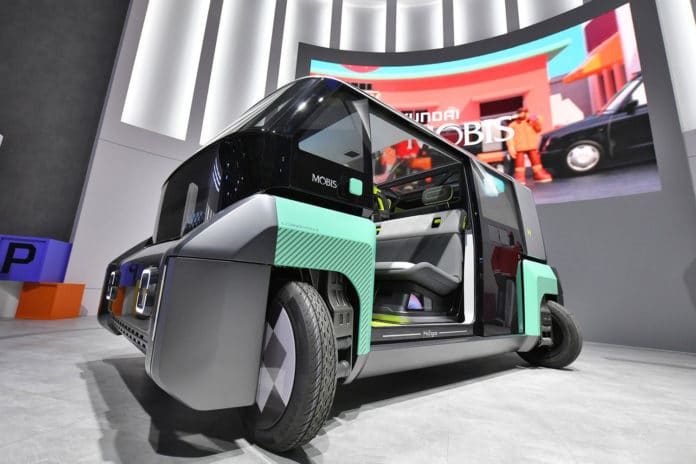Hyundai Mobis has succeeded in developing the next-generation automobile wheel technology, the ‘e-corner module,’ that allows 90-degree rotation parking and in-place rotation. The e-corner module integrates the steering, braking, suspension, and driving systems into a wheel.
The concept of the e-corner module was first unveiled at the 2018 CES. Through this time, Hyundai Mobis has successfully redefined the concept for its practical use on the automobile and has developed an ECU for control, and has also completed the functional testing. Once it is done with reliability verification and a feasibility study on mass production, Hyundai Mobis will begin undertaking mass production orders from global carmakers for its application.
The e-Corner challenges traditional drivetrain and chassis design by integrating engine, braking, suspension, and steering functions into one-wheel units located at all four corners of the vehicle. The biggest advantage of the e-Corner module is that it does not require any mechanical connection between parts, which thereby allows better use of space within the vehicle. This makes it easier to change the wheelbase and ensures much more flexibility in designing the direction of doors and the size of the vehicle.
The new e-Corner modules can be rotated about their axis even at a greater angle than Hyundai originally anticipated. It allows 90-degree rotation of the wheel when needed, for example, parking, and enables crab (sideways) driving and zero-turn, which means rotation without moving forward or backward. This feature will increase the agility of a vehicle running through the narrow streets of the city and accordingly improve the urban driving environment. If Hyundai pairs its e wheel blocks with a set of articulated robotic legs, we will see how passable vehicles on the new technology can be on and off the road.
Hyundai Mobis plans to use the e-Corner on electric vehicles and says they are an important element of vehicles called PBVs. Hyundai plans to make this technology a key part of its “smart city of the future.” Multipurpose self-propelled PBVs will be capable of many tasks, moving both people and goods.
Hyundai Mobis plans to develop a skateboard module by the year 2023 for the implementation of real-world vehicle performance through the integrated control of four e-corner modules and then combining it with the automatic driving control technology to ultimately provide a PVB mobility solution in the year 2025.
